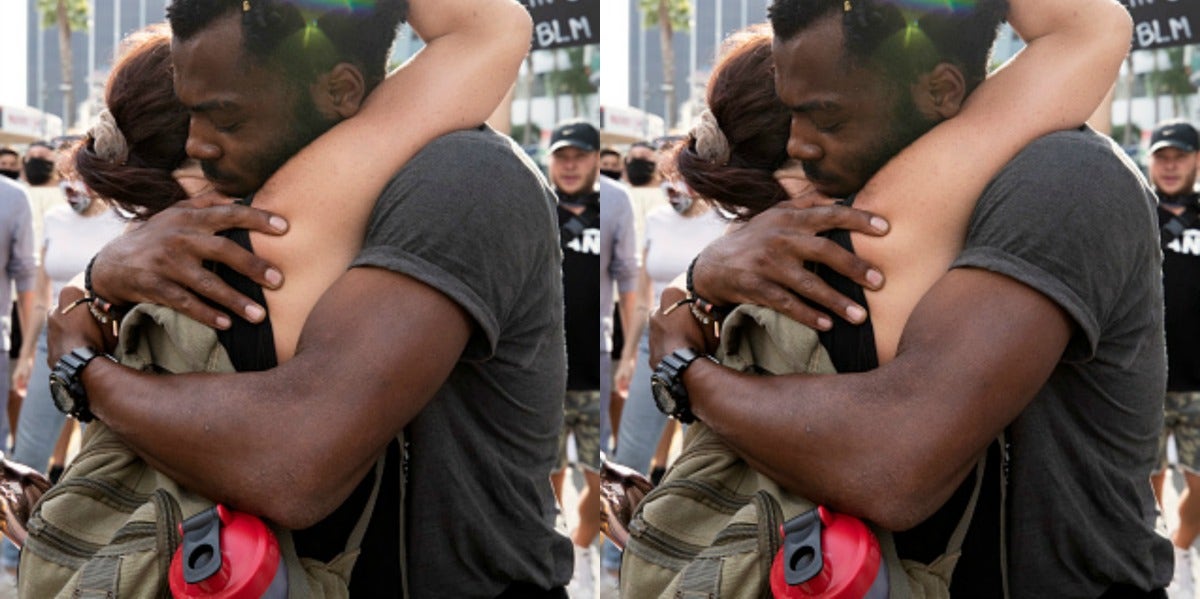
I honestly was wondering — what do I need you for? And I've figured something out.
By Brittany Walker Pettigrew, MSW, LCSW — Written on Jun 03, 2020
Photo: Getty

OK, so a few of my white friends have reached out to me over the last couple of days and have asked “What can I do to support you?” or “What can I do to take care of you?” They want to know how to be antiracist in these times.
I haven’t really known what to say. I have been taking care of myself and others for so long, I honestly was wondering — what do I need you for?
But I have figured something out. This is long, but this stuff ain’t simple.
I need my white friends and family to be in authentic dialogue — not debate, but real, authentic dialogue — with other white people who think differently than you.
To do this, you must be in authentic relationship with a person like that.
Go out and connect with another white person that you would be inclined to call one of "those" white people. I need you to get curious about your differences, and about how they came to believe as they do.
Each of you will need to agree to “both/and thinking,” which holds that multiple things can be true simultaneously.
This means their truth does not negate your truth, but rather that your truths coexist.
Get curious about how this could be possible when you were so sure you were on the side of truth.
Commit to moving forward with the acceptance of a third, transcendent truth that makes space for a diversity of world views, even if those world views challenge your core beliefs. (P.S. this will help you in your relationship with me too.)
RELATED: It's Not Black People's Job To Solve Racism
Why do I need this?
Because when you decide that talking to "those" white people is too uncomfortable and you choose to avoid contact with them altogether, they don’t just go away.
They don’t just recede into obsolescence simply because you have chosen not to regard them. Oh no. They go on about their business, runnin’ thangs.
You know who does have to deal with them?
Black and brown people like me.
When you withdraw from engaging with other white people simply because you don’t like the way they think, that is an abuse of your privilege.
Only people holding privilege in a situation get to choose with whom they engage, how they engage, and the timing and pacing of that engagement.
When you throw up your hands in disgust at the other, you are consenting to remain ignorant, while inevitably transferring that burden to someone else.
True allyship does not include willful blindness.
There is plenty of video evidence that shows exactly what is going on. (And if I’m being really real, I am resentful that it took all that video evidence to convince you in the first place... but I digress.)
I have come to understand that many black and brown people have been socialized and trained to “study the Master.”
We need to make a swift and accurate read of the the person holding power and privilege in all interactions, and strategize accordingly. Failure to do so may be the last mistake you ever make.
I don’t recall when I was taught this, but I learned it. It is has been essential, not just to my success, but to my very survival.
I must walk the razor’s edge of developing meaningful relationships with white people without making them too uncomfortable, because when what I say conflicts with a closely held core belief, the consequences for me are not just people hair-flipping and stomping off — they are devastating.
RELATED: Being A Black Man In America Means Never Feeling Safe
So white Liberals, go befriend a white Conservative. White Conservatives, go befriend a white Liberal.
Come together to talk about — again, not to debate, but to talk about — the hard stuff. Strategize ways to diversify your day-to-day experiences and expand your world views.
The purpose is not to change another person’s mind, but to listen in order to understand.
Related Stories From YourTango:
Yes, it will be hard. You will become frustrated. You may even succumb to the allure of separating people from their humanity, which is something that most of my friends and family would say is not a behavior they would be proud of.
But I need you to sit with that discomfort. They are just feelings. They will not kill you.
And then I need you to keep going.
I guarantee that there is no one who leaves that kind of engagement unchanged.
I need you not to delegate the work of that change to me.
White people, I need you to come get yo’ cousin.
More for You:
Brittany Walker Pettigrew, MSW, LCSW, is a more than 20-year veteran of the Alameda County Department of Children and Family Services in California. where, as a Program Manager, she has prioritized creating and supporting an organizational culture that seeks to dismantle the effects of institutional racism and oppression, and allows for staff to provide humble, thoughtful and socially just service to families striving to recover from the crisis of child maltreatment. A California native, Ms. Walker Pettigrew has been engaged in cross-cultural dialogue with women from Alabama for the purposes of gaining understanding across those differences.
This article was originally published at Facebook. Reprinted with permission from the author.
